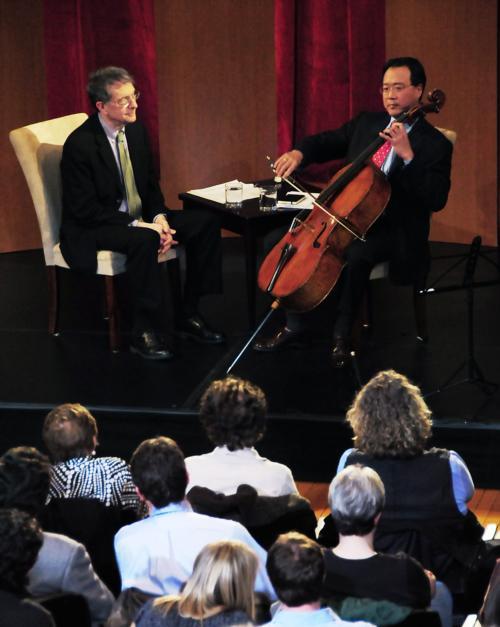
News
Pro-Palestine Encampment Represents First Major Test for Harvard President Alan Garber

News
Israeli PM Benjamin Netanyahu Condemns Antisemitism at U.S. Colleges Amid Encampment at Harvard

News
‘A Joke’: Nikole Hannah-Jones Says Harvard Should Spend More on Legacy of Slavery Initiative

News
Massachusetts ACLU Demands Harvard Reinstate PSC in Letter

News
LIVE UPDATES: Pro-Palestine Protesters Begin Encampment in Harvard Yard
Yo-Yo Ma Performs In Radcliffe Yard

As Yo-Yo Ma ’76 and his interviewer Howard E. Gardner ’65 waited to begin their conversation last night on the role of music in the world, the famous cellist took in the room and said, “This is like a wedding.”
Ma displayed good humor and genuine affection for both his interviewer and the crowd that gathered to see him in the Radcliffe Gymnasium as he explained his attitudes towards the cello, culture, and the world at large.
Gardner, a professor at the Graduate School of Education, introduced his interviewee as “the pre-eminent cellist of his generation.” Over the course of the interview—recorded for the TV show “Extraordinary Minds at Work”—Ma displayed his talent for his instrument and his deep understanding of the music written for it.
“Music has a wonderful way of expressing the inner life of somebody or a people,” he said. He reserved particular praise for Bach, whose “Prelude to the First Suite” was the first piece Ma learned.
“Bach had a wonderful way of expressing the infinite,” he said before treating the audience to a performance of the piece, which he learned at age four. After the performance, Ma asked the audience what thoughts the recital aroused. Responses ranged widely from the thought of Bach’s children running through a field of flowers to one person who felt it helped her recover from a hectic week.
Gardener probed repeatedly at Ma’s experimental inclinations and his will to take musical risks.
“I may be a bit of a risk-taker,” Ma said. “We’re in a society where you need change and new things to stay in the game.”
Despite this will to push boundaries, Ma has continued to live in Cambridge ever since he was a student here in the seventies. After graduating, he lived in Leverett House as a resident tutor for three years.
“The richness of the knowledge base of this place is so fabulous,” he said, referring to all of Cambridge rather than just Harvard.
As happy as Ma said he has been in Cambridge, he has spent much of his life on the road. He said that he has spent 20 of the last 30 years traveling. This experience, along with his multiethnic background, has given Ma a deep interest in global inter-connections, he said.
Ma’s work with the Silk Road Project has helped him explore the global nature of music and culture in general. This project, which seeks to unite musicians from across the medieval Silk Road that ran from Asia through the Middle East to Europe, has been important to Ma’s work over the last five years.
“We may have common languages and economic systems,” he said, “but do we have any insight into how someone else thinks?”
Want to keep up with breaking news? Subscribe to our email newsletter.
